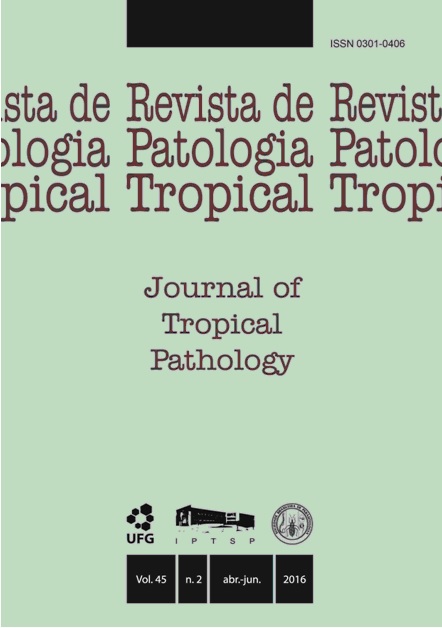AVALIAÇÃO DO CONSUMO DE Lactobacillus casei SHIROTA PARA O CONTROLE DE GIARDÍASE EM CRIANÇAS
DOI:
https://doi.org/10.5216/rpt.v45i2.41772Palavras-chave:
Giardia duodenalis, Lactobacillus casei Shirota, terapêutica.Resumo
A giardíase é uma importante doença parasitária de elevada ocorrência mundial e, apesar de comumente ser considerada de bom prognóstico, sabe-se que crianças e pacientes imunocomprometidos podem apresentar perda de peso e depauperamento físico e mental. Há um grande número de drogas com atividade giardicida, mas, no decorrer dos anos, alguns protozoários têm apresentado resistência à maioria dos tratamentos recomendados, o que exige o desenvolvimento de novas estratégias para o controle de Giardia duodenalis. No presente trabalho, objetivou-se avaliar a eficácia do uso de Lactobacillus casei Shirota para o controle da giardíase em crianças naturalmente infectadas. Para tanto, foram selecionadas 12 crianças com giardíase clínica e laboratorialmente diagnosticada, das quais 6 compuseram o grupo controle, sem tratamento, e as demais consumiram 1,6x1010 lactobacilos vivos, diariamente, da espécie Lactobacillus casei Shirota, mediante ingestão de uma bebida láctea comercialmente disponível. Depois do início do tratamento, foi determinado o número de cistos eliminados por meio de exame coproparasitológico, segundo o método de Faust com modificações, e observação da consistência das amostras fecais coletadas. Transcorridos 21 dias de tratamento, não houve detecção de formas evolutivas de Giardia duodenalis nas fezes dos indivíduos que consumiram a bebida láctea e verificou-se melhora na consistência fecal, o que não ocorreu com o grupo controle, demonstrando-se, assim, o potencial de L. casei Shirota para o controle de giardíase em crianças.
Downloads
Downloads
Publicado
Como Citar
Edição
Seção
Licença
The manuscript submission must be accompanied by a letter signed by all authors stating their full name and email address, confirming that the manuscript or part of it has not been published or is under consideration for publication elsewhere, and agreeing to transfer copyright in all media and formats for Journal of Tropical Pathology.

